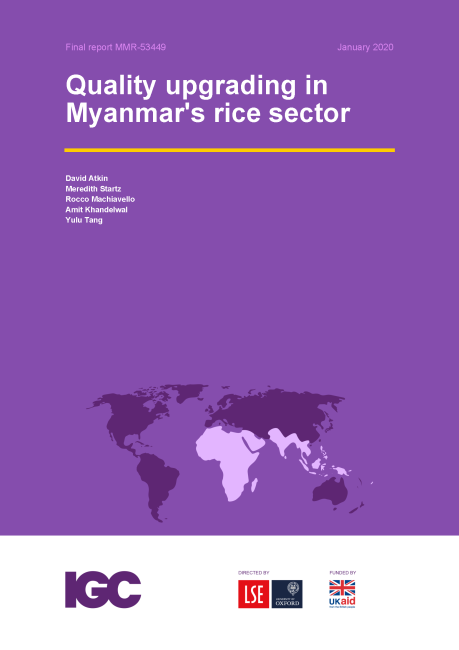Quality upgrading in Myanmar's rice sector
Linking developing countries’ agricultural producers to foreign markets often requires upgrading product quality (Gereffi (1999), Verhoogen (2008), Atkin et al. (2017)). Typical interventions seek to target a single point along the chain, such as improving fertiliser access to farmers or providing processors credit to upgrade technology. For agricultural goods, achieving higher quality may require upgrading at multiple stages along a long, complex chain; typically involving farmers, processors, wholesalers, and exporters. Thus, this project investigates whether quality upgrading in agricultural value chains requires interventions at multiple stages, or whether interventions at one end can generate upgrading throughout the chain.
For studying this research question, Myanmar provides the ideal environment for a case study. Myanmar possesses a sufficiently large number of processors interested in upgrading, which provides statistical power to implement the experimental research design.
The methodology will comprise of two stages:
- Collect and analyse data on Myanmar’s rice sector to understand the interactions between quality decisions at different points along the value chain better.
- Conduct field experiments that involve interventions at multiple points along the rice value chain, such as, providing high-quality seeds for farmers and so on. Also test which type of interventions are most effective and whether interventions targeting market imperfections become effective only when implemented along multiple stages of the chain.
This research project was requested by stakeholders in the Ministry of Commerce (MOC) with the goal of informing policy to raise rice exports. Myanmar’s once-dominant position as a global rice exporter highlights the sector’s significant potential for export growth. The initial engagement in Myanmar’s rice industry is part of the broader collaboration scheme between the IGC and the MoC. Given this strong engagement, it is expected that the findings will influence the MoC’s policy decisions, as well as local stakeholders in the rice industry. One of the final goals of this project is to come up with the most cost-efficient way to achieve quality upgrading, thus supporting a government with weak capacity to pursue a robust quality programme in the long term.





